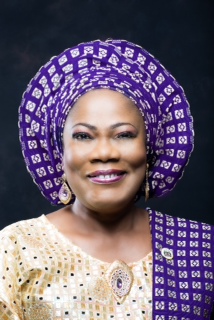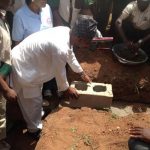
We’re Repositioning Our Schools To Meet Global Standards – Osun Deputy Gov
 How will you react to the opposition to the state’s school merger and reclassification policies?
How will you react to the opposition to the state’s school merger and reclassification policies?
Well, we cannot discuss the merger of schools and reclassification policies without giving the details of the background to the major reforms and policies in the state’s education sector. When our administration came on board in 2010, what we met on ground was terrible and disgusting.
There was no data about the schools, infrastructure was nothing to write home about as classrooms were already caving in, and staff welfare or training was not in place. As at that time statistics revealed that only three per cent of our secondary school leavers were admissible to higher institutions.
That informed the government’s decision to hold an all-inclusive education summit, which took place precisely in February 2011, and was chaired by the Nobel Laureate, Professor Wole Soyinka. So, the reclassification is meant to actualise all the reforms. That is the answer in a nutshell.
However, for adequate understanding of the whole arrangement, we have reclassified the school system into three basic structures; the elementary, middle and high schools structures in accordance with the age group of the children which were classified as age six to nine; 10 to 14 and 15 to17 in that categories.
The reclassification involves the various components of the reforms we are carrying out for each of the categories in connection with the ages and mental capability, as well as the needs of the students.
To start with, in the elementary school the pupils are children in their formative stage of their lives. I want to emphasise here that whatever one puts in the foundation of a house determines what the future of that house would look like.
But there had been school feeding project before this administration came on board.
Of course, the free meal project was originally introduced to the State of Osun through the Universal Basic Education Commission (UBEC) Act of 2004.
The Federal Government started the pilot project in 13 states including our state in May 2006, and they advanced the funding expecting that all states of the federation should feed their primary school pupils at least once a day.
When we assumed offices in 2010, what we found out the kids were being fed with was not attractive to us, it was not even attractive to the children themselves.
Apart from the cocoa drink which was very good, the foods weren’t rich enough and to address that, we asked nutritionists and dieticians for professional recommendations for foods that will be ideal for children in their formative years.
That was meant to address the stunted growth we observed among the children especially those in the rural areas. And indeed, the recommended foods were those with carbohydrates, protein and fruits on daily basis.
The programme was originally tagged “Osun Home Grown Feeding Programme” but when we came on board we rebranded it and named it Osun Elementary School Feeding and Health Programme (O’Meal). Apart from feeding the children, we also deworm them and that is done every six months.
The statics as at the end of last session in July shows that on a weekly basis, we slaughter 15,000 fresh chicken, 7,800 crates of eggs, 400 tons of fresh fish and we also slaughter 35 heads of cattle for them.
The cost implication for this new session is not yet ready, but I am sure it must have increased because the reports have always shown tremendous increase in school enrollment.
So, we spent N14.9 billion on the school feeding project on a daily basis, and as at last school year we have spent N3.6 billion yearly.
What have been the effects of this investment on the school enrolment and the academic growth of the children?
UNESCO’s report of January 2012 indicated that Osun State was the second state in the South-West geo-political zone of the federation with the highest number of out-of-school children.
You can believe that Lagos, Ogun, Ondo and Ekiti States were clearly ahead of Osun State.
But today, with the report of the National Bureau of Statistics released on July 8, last year, the State of Osun has the highest figure of primary school enrollment.
And today our pupils are very attentive in class, they grow better and absenteeism has reduced to almost zero as against what we used to have before. Now, they anxiously await their meal.
When we started this programme on April 30, 2012, towards the end of the same month, we recorded an increase in enrollment of about 25 per cent because school enrolment increased by 38,000 pupils. We started with 155,318 pupils and by ending of May we already had 194,258 pupils on enrollment.
So, without this programme we would have lost 38,000 pupils who would never have been able to go to school.
But couldn’t the reforms be achieved without the reclassification and merger of schools?
The reclassification is in the best practice of the global standard. That is the way it is done where we copied our education system from. There is a big advantage in putting children in the same age brackets together in the same learning environment and this is the opinion of psychologists.
We have 1,738 elementary schools scattered all over the state whereas the population of the state is less than four million. However, most of these schools we have uneven distribution of teachers and facilities.
In some schools we have less than 30 pupils with 18 teachers, while in some we have more than 500 pupils with about six teachers. Now, the reclassification programme of the government is meant to address all such issues with the distribution of these model schools across all the local government areas.
For instance, before we came on board some schools were only collecting N200 per month as grant, but we have increased that to N400 per pupil per month and this runs into several millions of naira instead of about N25 million the previous administration was spending on school allocation.
So, as at July, last year we have spent about N856, 800,000 per year as school grants to our schools. Most of the school uniforms adopted by the government as observed are already fading, while there is controversy surrounding the school merger policy.
How is the government resolving all these?
We are already resolving that, and we are happy that our people are actually realising the fact that our efforts are aimed at reforming the ailing education sector.
You know it is natural for people to resist change especially changes that have not been experienced in the past and in a society where politicians don’t cultivate the habit of fulfilling political promises and where they are used to policy summersault. But, I want to assure you that is not going to be the case here.
There has been complaint about the uniformity in the uniforms as critics are insisting that it is difficult to differentiate the pupils from one school to another. What do you think about this?
Like I have mentioned, my prayer is that we progress in life. This state is moving forward and it is the same practice of uniformity in school uniforms that is being practiced abroad.
Through the badges and berets we can identify and differentiate the pupils and their schools. Let me say this, when we were young, all the Anglican schools used to have the same school uniforms all over the country and they were called Ionian colleges.
We will soon get used to it. In the United Kingdom (UK), it doesn’t matter whether your child is in London or Edinburgh, you can enter a shop and pick up his or her uniform.
But some of the uniforms are already fading, thus suggesting that the quality is poor?
We have noticed some of these things and more importantly especially that of the middle schools. We are working to change it. Meanwhile, what was initially provided was distributed freely but what we have done now is to engage about 10,000 of our youths, through the Omoluabi Garment Factory, which was set up in Abeere, by this administration as part of its employment creation programme.
TELEGRAPH



